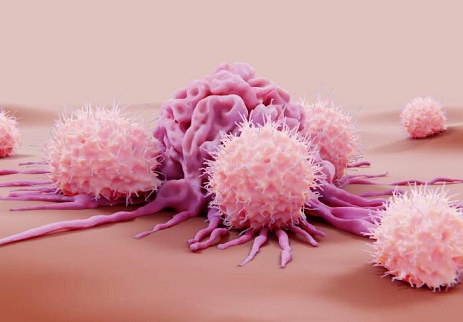Nikhil Prasad Fact checked by:Thailand Medical News Team Aug 04, 2024 1 year, 4 months, 3 weeks, 5 days, 29 minutes ago
Colon Cancer News: A groundbreaking study from researchers at the University of Messina, the National Institutes of Health, and the University of Genoa has revealed crucial insights into how immune cells behave in patients with colon cancer. This discovery may pave the way for new therapeutic strategies to combat this prevalent and deadly disease. This
Colon Cancer News report delves into the key findings and implications of the study.
 Neutrophil-like monocytes' role in colon cancer immune evasion
The Study's Core Findings
Neutrophil-like monocytes' role in colon cancer immune evasion
The Study's Core Findings
In their research, scientists identified a significant increase in a specific type of immune cell, known as neutrophil-like monocytes, in both the blood and tumor tissues of colon cancer patients. This finding is critical as it sheds light on the complex interactions between these cells and natural killer (NK) cells, which are essential components of the immune system's defense against tumors.
Understanding Neutrophil-like Monocytes
Monocytes are white blood cells that play a pivotal role in the body's immune response. They typically circulate in the blood and can differentiate into various types of cells that aid in combating infections and diseases. However, in patients with colon cancer, researchers observed a particular subset of monocytes that express CD15, a marker usually found on neutrophils, another type of white blood cell. These neutrophil-like monocytes were found to be significantly elevated in both the peripheral blood and the tumor tissues of these patients.
The Impact on Natural Killer Cells
Natural Killer (NK) cells are a vital part of the immune system, responsible for detecting and destroying tumor cells and cells infected by viruses. However, the study found that the increased presence of neutrophil-like monocytes in colon cancer patients correlates with a rise in dysfunctional NK cells. These NK cells exhibited high levels of TIGIT, an inhibitory receptor that impairs their ability to fight tumors effectively. The presence of TIGIT+ NK cells was closely associated with the frequency of neutrophil-like monocytes, suggesting that these monocytes play a significant role in inducing NK cell dysfunction.
Mechanisms Behind NK Cell Dysfunction
The study provided detailed insights into the mechanisms by which neutrophil-like monocytes suppress NK cell activity. It was found that these monocytes secrete high levels of interleukin-10 (IL-10), a cytokine known for its immune-suppressing properties. When NK cells were exposed to IL-10 in the presence of neutrophil-like monocytes, they acquired the TIGIT receptor and showed reduced activity. Additionally, the monocytes engaged the NKp30 receptor on NK cells, further inhibiting their function. These findings indicate that neutrophil-like monocytes employ multiple pathways to suppress NK cell activity, thereby aiding the tumor in evading the immune response.
Detailed Analysis of Neutrophil-like Monocytes
Research
ers conducted an in-depth phenotypical and morphological analysis of these neutrophil-like monocytes. Using advanced imaging techniques, they observed that these cells share characteristics with both monocytes and neutrophils. The cells displayed a multi-lobular nuclear structure similar to neutrophils, which was confirmed through DAPI and hematoxylin and eosin staining. Moreover, the size of these cells was intermediate between typical monocytes and neutrophils, further indicating their mixed identity.
The Broader Implications
The discovery of neutrophil-like monocytes as a new player in the immune suppression observed in colon cancer patients offers significant insights into the tumor microenvironment. By understanding how these cells interact with NK cells and other components of the immune system, researchers can develop new strategies to counteract these suppressive mechanisms. This could lead to more effective treatments for colon cancer and potentially other types of cancer as well.
Potential Therapeutic Targets
Given the significant role of neutrophil-like monocytes in immune suppression, they present a promising target for cancer immunotherapy. Several therapeutic approaches could be explored, including:
-Blocking Recruitment and Differentiation: Strategies to inhibit the recruitment of these monocytes to tumor sites or to prevent their differentiation into the suppressive phenotype could help restore immune function.
-Neutralizing Suppressive Factors: Therapies that neutralize IL-10 or other suppressive cytokines produced by these monocytes might reduce their ability to inhibit NK cells.
-Targeting NK Cell Receptors: Blocking the engagement of inhibitory receptors like TIGIT and NKp30 on NK cells could restore their tumor-fighting capabilities.
Future Directions
The study sets the stage for further research into the development and function of neutrophil-like monocytes in various cancers. Future studies could focus on understanding the signals that drive their differentiation and suppressive capabilities. Additionally, researchers could explore the potential of using these cells as biomarkers for prognosis and treatment response in cancer patients.
Conclusion
The identification of neutrophil-like monocytes as key players in cancer immune evasion highlights the complexity of the tumor microenvironment. Targeting these cells could enhance the effectiveness of existing therapies and lead to the development of new strategies to combat colon cancer.
The study findings were published in the peer-reviewed International Journal of Molecular Sciences.
https://www.mdpi.com/1422-0067/25/15/8470
For the latest
Colon Cancer News, keep on logging to Thailand Medical News.
Read Also:
https://www.thailandmedical.news/news/non-invasive-home-based-screening-reduces-risk-of-colorectal-cancer-death-by-33-percent
https://www.thailandmedical.news/news/canadian-study-finds-that-ursolic-acid-could-be-used-as-an-adjuvant-to-combat-colorectal-cancer
